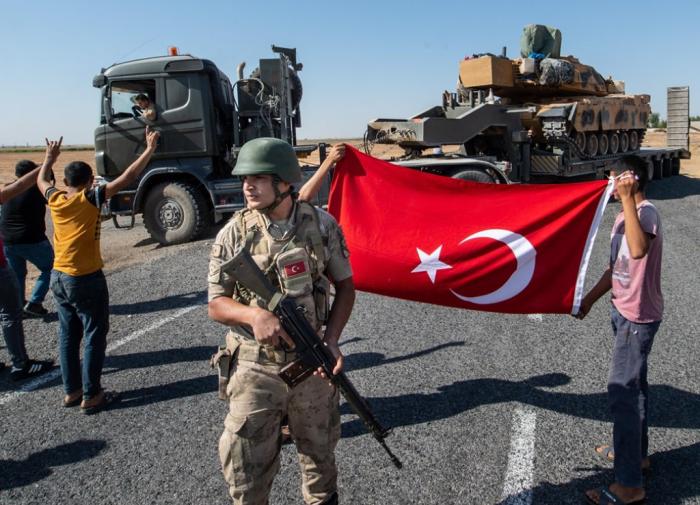Who is behind the conflict between Armenia and Azerbaijan and what consequences can it lead to against the backdrop of Turkey's imperial ambition? Pravda.Ru asked these and other questions to military historian Yuri Knutov.

Turkey's appetites are growing
"The military conflict between Armenia and Azerbaijan, or rather between Nagorno-Karabakh and Azerbaijan, is escalating. Is this a full-scale military operation to the bitter end?"
"If one takes a look at how the events began, one have ask many questions in this connection. Initially, NATO held military exercises near Russia's western borders. Then they did it in Ukraine. All this was timed to coincide with the crisis in Belarus. Now the exercises are over, the crisis in Belarus is gradually stabilizing, but at the same time another crisis sparked in Nagorno Karabakh. I see one architect here, and this is Washington. Azerbaijan wants to restore sovereignty over Nagorno-Karabakh. Turkey, a NATO member, is also behind this. I can see the following motives behind the crisis:
- against the background of limited hostilities, it becomes possible to strengthen the positions of Azerbaijan in future negotiations on a peaceful settlement of the crisis;
- in the event of a full-scale operation, the goal is to transfer Nagorno-Karabakh under the control of Azerbaijan.
"Given Erdogan's tough statements about Turkey's support for Azerbaijan and the need to return Nagorno-Karabakh, I believe that Azerbaijan is determined to fight to the bitter end, which means serious losses not only among the military, but also among the civilian population. Hostilities must be stopped at the very beginning, before they develop into a large-scale conflict."
"The conflict has been going on for almost thirty years, and it is not going to subside. Quite on the contrary, it becomes more serious. Do you think that no one should interfere and let those people fight each other?"
"If it wasn't for so many deaths, including civilian casualties, it could be the case. Yet, given the possible civilian casualties, I believe that one should not let this conflict loose. At the same time, however, it is not so easy to stop it either.
"Both sides have strengthened their military power. Armenia is a three-million-strong nation. Many of them live and work in other countries as guest workers, so the population is 2-2.5 million. Azerbaijan is a nine-million-strong nation. Given Azeri guest workers, the country has 7-7.5 million people. The Armenian army counts 40,000 troops, whereas Azerbaijan has a 120,000-strong army. In terms of military hardware, the Azerbaijani army is three times stronger than the Armenian one. There is considerable superiority in aviation and artillery. All senior officers of the Army o Azerbaijan underwent retraining in Turkey. Israel provided assistance in the modernization of Soviet weapons that Azerbaijan has. Azerbaijan bought weapons from Russia, Belarus and NATO countries (primarily from Turkey). Armenia also purchased state-of-the-art arms systems, including Iskander complexes and new fighter jets. The Armenian army also meets today's requirements. However, the Azerbaijani army enjoys the support of Turkey. The Turkish military perform the role of advisers and can provide direct military assistance to their counterparts in Azerbaijan.
Turkey's Erdogan set a goal to restore the Ottoman Empire, create something similar. We can see an aggressive course aimed at expanding Turkey's influence in adjacent regions:
- in Syria's Idlib province, pro-Turkish forces conduct provocative actions against the Russian military, when UAVs attack Russian military in Syria;
- in Libya, when Turkish warships and humanitarian drones were sent there to prevented Haftar's army from taking over Tripoli. In exchange, Turkey received preferences for the development of oil and gas deposits on the offshore shelf adjacent to Libya.
"Turkey is now trying to become a very powerful state that wants to take over adjacent territories with their gas and oil resources. Turkey is a transit country in the natural gas transportation system, including the gas pipeline system from Russia. Turkey is not interested in the construction of the Israel-South Europe gas pipeline - it is striving to become a gas hub instead. Turkey's actions to protect and support Azerbaijan's gas pipeline also pursues Ankara's geopolitical goals to become one of the largest energy exporting countries. Turkey has new perspectives, and Erdogan is trying to implement them by military, rather than economic or diplomatic means."
"Are you trying to say that it is Turkey that masterminded this conflict in Nagorno Karabakh?"
"Definitely. Turkey and Washington."
Turkey's strategic goal
"What is Turkey's strategic goal? For example, Karabakh and adjacent areas will be recaptured, the territorial integrity of Azerbaijan will be restored. Are they going to deal with Armenia next?"
"I doubt that they will go further, because Armenia is a member of the CSTO. Armenia already has the right to apply to the CSTO for military assistance. Both Russia and other parties are obliged to help Armenia in protecting its territorial integrity. If Nagorno-Karabakh is a disputed territory, then the territory of Armenia definitely falls under the CSTO.
"However, there will be an attempt made to reconquer Nagorno Karabakh. Most importantly, both countries announced mobilization. They may proceed to full-scale hostilities with corresponding losses, including civilian casualties. Today, both Armenia and Azerbaijan have powerful weapons at their disposal:
- Armenia's Iskander complexes hit targets at a range of 450 kilometers;
- Azerbaijan's Belarus-made Polonaise complexes with Chinese-made missiles hit targets at a distance of 300 kilometers.
For common people, this war will be brutal.
No comments :
Post a Comment